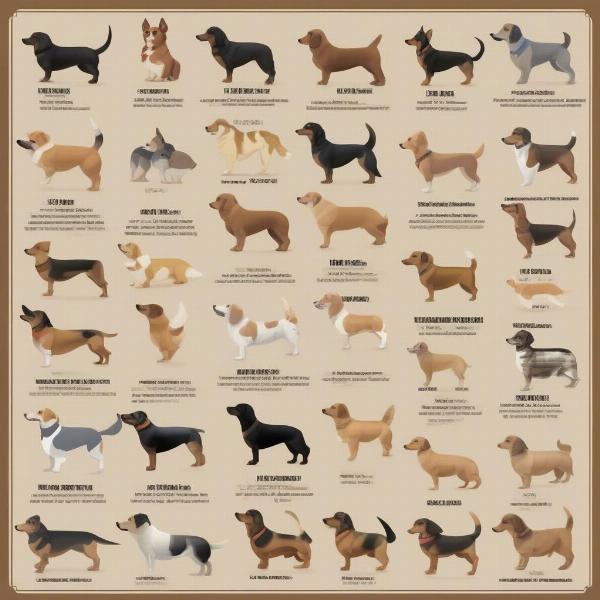The term “T Rex dog” has gained popularity online, often used to describe dogs with short legs and robust bodies. While it’s a catchy nickname, it’s important to remember it doesn’t refer to a specific breed. This article will explore the breeds commonly associated with the “T Rex dog” label, delve into their care requirements, and separate the myths from the realities of owning one of these charming companions.
 Short-legged dog breeds like Corgis and Dachshunds are often called "T Rex dogs."
Short-legged dog breeds like Corgis and Dachshunds are often called "T Rex dogs."
Understanding the “T Rex Dog” Phenomenon
The “T Rex dog” isn’t a recognized breed but rather a colloquial term used to describe dogs resembling a miniature Tyrannosaurus Rex. These dogs typically possess short legs, a muscular build, and a confident demeanor. Breeds often associated with this nickname include Corgis, Dachshunds, and even mixed breeds that inherit these physical traits. Understanding that this term encompasses a variety of breeds is crucial for prospective owners seeking the right fit for their lifestyle.
Breeds Commonly Called “T Rex Dogs”
Several breeds are often referred to as “T Rex dogs.” Corgis, with their long bodies and short legs, are perhaps the most popular example. Dachshunds, known for their elongated physique and short, sturdy legs, also fit the bill. Some mixed breeds, inheriting these traits from their parents, can also exhibit the “T Rex” look.
Care and Considerations for “T Rex Dogs”
While their appearance might be unique, caring for a “T Rex dog” is similar to caring for any other breed. They require a balanced diet, regular exercise, and consistent training. However, due to their short legs, special attention should be paid to their back health. Avoid activities that put excessive strain on their spine, such as jumping from high places. Regular vet checkups are essential to monitor their overall health and address any breed-specific concerns.
Separating Myth from Reality: “T Rex Dog” Health
A common misconception is that all “T Rex dogs” are prone to back problems. While certain breeds, like Dachshunds, have a higher predisposition to intervertebral disc disease (IVDD), it’s not a guaranteed issue. Maintaining a healthy weight, providing proper exercise, and avoiding stressful activities can significantly reduce the risk.
Conclusion: Embracing the “T Rex Dog” Charm
The “T Rex dog” label, while not scientifically accurate, highlights the endearing qualities of these short-legged companions. Understanding the breeds associated with this term, their specific care requirements, and separating myths from reality is essential for prospective owners. By providing proper care and attention, you can ensure a happy and healthy life for your “T Rex” companion.
FAQs
- Are “T Rex dogs” a recognized breed? No, “T Rex dog” is a nickname, not an official breed.
- What breeds are commonly called “T Rex dogs”? Corgis and Dachshunds are commonly associated with this term.
- Do all “T Rex dogs” have back problems? Not all, but some breeds are more prone to back issues. Proper care can mitigate risks.
- What are the specific care requirements for “T Rex dogs”? They need a balanced diet, regular exercise, and attention to back health.
- Where can I find a reputable breeder of “T Rex dogs”? Since it’s not a breed, look for reputable breeders of the specific breeds you’re interested in (e.g., Corgi or Dachshund breeders).
- Are “T Rex dogs” good with children? This depends on the individual dog and their training. Research the specific breed’s temperament.
- How much exercise does a “T Rex dog” need? Their exercise needs vary depending on the breed, but generally, moderate daily exercise is recommended.
About ILM Dog
ILM Dog is your trusted global resource for expert dog care advice, covering everything from breed selection and health to training and nutrition. We offer practical, reliable information for dog owners of all experience levels, helping you provide the best possible care for your canine companion. For expert advice tailored to your dog’s specific needs, reach out to our team. Email us at [email protected] or call us at +44 20-3965-8624. We’re passionate about helping you nurture a happy, healthy relationship with your furry friend. Visit ILM Dog for more information.